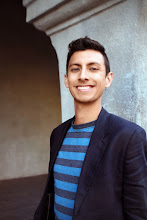A sense of history
So, if I'm going to spend the next six years of my life in devotion to one vocation, I should probably know something about what I study. Let's take my pursuit of a scientific career. I have always regretted the sequence of events related to my scientific development. I started out as a straight-A student in my first year of school. I transferred to the University of Wisconsin - Madison shorty after and became involved in research. The science, itself, was fascinating and challenging, yet I always remained frustrated at the classroom. I struggled through courses in which I was applying the material in a world-class scientific laboratory.
My long-standing fascination with leadership allowed me to broaden my academic interests by the end of my undergraduate career. I was lured into a profession that addressed three issues that I adored: science, social dynamics, and the passing on of information. I had the honor of working with the Wisconsin Program for Scientific Teaching doing research and programming in undergraduate science education. However, I gained something more than a paycheck and professional development through my employment.
After spending years reading about science education at large research universities, I have a firmer understand of the frustration I had as an undergraduate. While I appreciated the great research opportunities at this institution, the instruction had a lot of room for improvement, specifically for people from diverse learning styles and backgrounds. I also recognize the education of scientific ideas as a fundamental and essential element of the scientific process.
I wish I would have known the things I now know about scientific pedagogy when I entered university. In a similar spirit, I am determined to learn about history instruction before I re-start my graduate education. I'd like to know the nature of history and what it means to learn past events. I turned to the location that any research project begins, the library. While there are few books of the teaching of university-level history, what I found has changed my perception of scholarship.
I'll narrow my research down to my experience of one book, On Teaching History in Colleges and Universities by Earl Beck. In the section The Many Faces of Clio, Beck illustrates some of the fundamentally different ways that scholars view History. One way to view History is as an aesthetic pursuit, much like poetry or dance. I am finding that a masterful historian can move emotions and human understanding in a way that other art cannot. In fact, History has its own Muse, Clio, as mentioned in the title of this chapter.
The list goes on and on, but two sections have struck me as the way I view History. The first illustrates History as the pursuit of context and defines the field as a social science. This closely resembles how I have felt about History, since I view "current events" as being "current history." One cannot understand the present to a significant degree without understanding current developments in a larger context. History provides that context. As with any observation, one must observe the entire specimen before drawing any conclusions.
Yet, there was another vision of History that has struck me more than the others. This vision is best communicated through two quotes shared by Beck:
"Fortunately, the past never dies for man. Man may forget it, but he always preserves it within him. For, take him at any epoch, and he is the product, the epitome, of all the earlier epochs. Let him look into his own soul, and he can find and distinguish these different epochs by what each of them has left within him." (The Ancient City. A study on the religion, laws and institutions of Greece and Rome.)
-and-
"It is this which forces us to consider that the knowledge gained from the study of true history is the best of all educations for practical life. For it is history, and history alone, which without involving us in actual danger, will mature our judgment and prepare us to take right views, whatever may be the crisis or the posture of affairs." (The Histories of Polybius)
History is a way for us to look into ourselves and see something more than what we are as individuals. Without the danger and sacrifice inherent to experience, we can use the experiences that we have already gained, as individuals and through the lives of others, to cultivate wisdom in our own lives. This makes the study of History a higher vocation, a calling. As historians, we seek to understand the world around us in a way that no other pursuit can reveal.
I'm glad I feel this earlier in my career as a historian scientist rather than at the end. I cannot wait for my move in four weeks time and the changes it will bring.
Labels: Biology, Clio, diversity, graduate school, history education, On Teaching History in Colleges and Universities, philosophy of history, Science education


0 Comments:
Post a Comment
<< Home